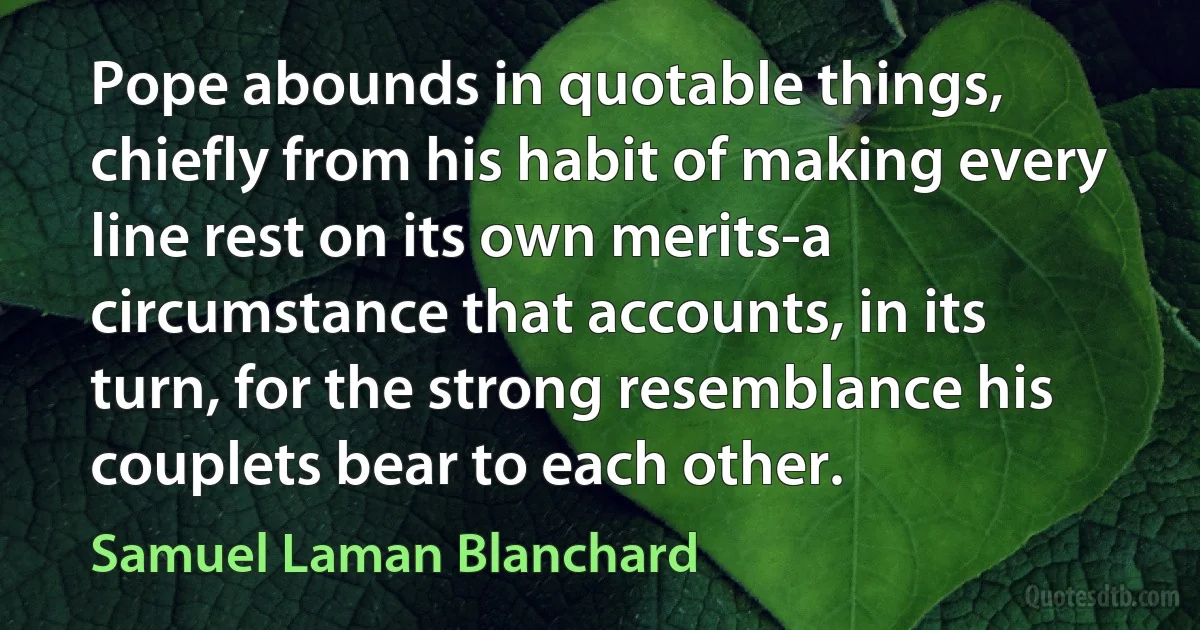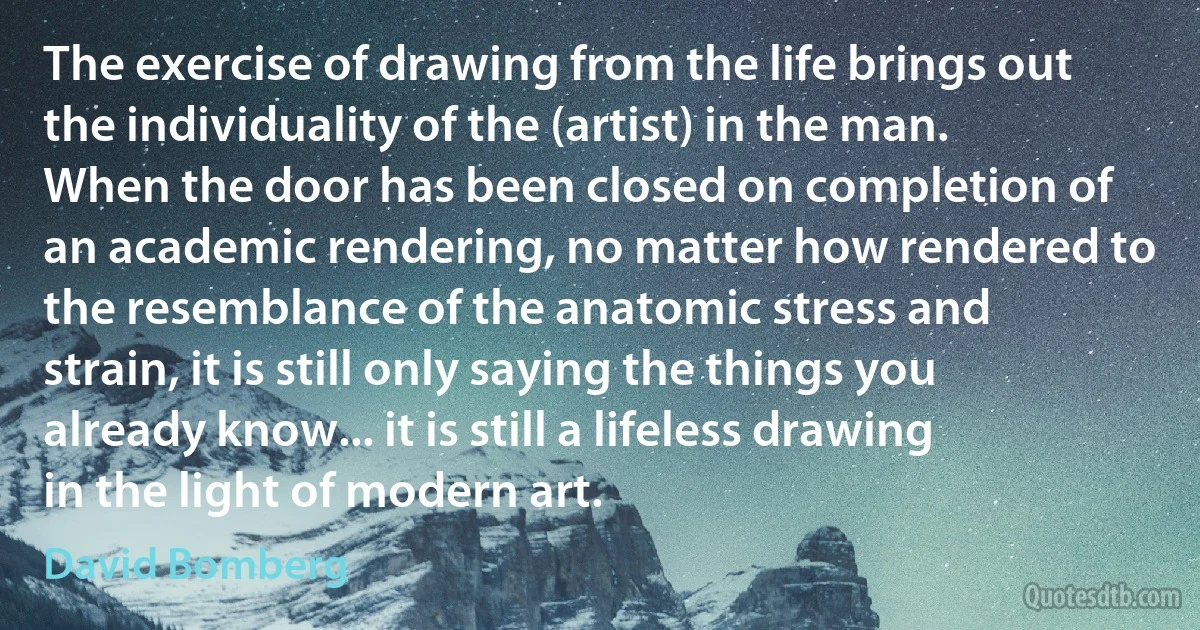Resemblance Quotes - page 5
As a national emblem, it is significant of our higher cause, the cause of a superior race, and a higher civilization contending against ignorance, infidelity, and barbarism. Another merit in the new flag is, that it bears no resemblance to the now infamous banner of the Yankee vandals.

William Tappan Thompson
Not one glance of compassion, not one commiserating reflection, that I can find throughout his book, has he bestowed on those who lingered out the most wretched of lives, a life without hope in the most miserable of prisons. It is painful to behold a man employing his talents to corrupt himself. Nature has been kinder to Mr. Burke than he is to her. He is not affected by the reality of distress touching his heart, but by the showy resemblance of it striking his imagination. He pities the plumage, but forgets the dying bird. Accustomed to kiss the aristocratical hand that hath purloined him from himself, he degenerates into a composition of art, and the genuine soul of nature forsakes him. His hero or his heroine must be a tragedy-victim expiring in show, and not the real prisoner of misery, sliding into death in the silence of a dungeon.

Thomas Paine
The story of Christ has not one trait, either in its character, or in the means employed, that bears the least resemblance to the power and wisdom of God, as demonstrated in the creation of the universe. All the means are human means, slow, uncertain, and inadequate to the accomplishment of the end proposed; and therefore the whole is a fabulous invention, and undeserving of credit.

Thomas Paine
In the final, positive state, the mind has given over the vain search after Abolute notions, the origin and destination of the universe, and the cause of phenomenon, and applies itself to the tudy of their laws, - that is, their invariable relations of succession and resemblance. Reasoning and observation, duly combined, are the means of this knowledge. What is now understood when we speak of an explanation of the facts is simply the establishment of a connection between single phenomena and some general facts, the number of which continually diminishes with the progress of science.

Auguste Comte
This is our mission: to cast a ray of light and pass on. I compare the effects of these first lessons the impressions of a solitary wanderer who is walking serene and happy in a shady grove, meditating; that is leaving his inner thought free to wander. Suddenly a church bell pealing out nearby recalls to himself; then he feels more keenly that peaceful bliss which had already been born, though dormant, within him.
To stimulate life, leaving it free, however, to unfold itself, that is the first duty of the educator.
For such a delicate mission great art is required to suggest the right moment and to limit intervention, last one should disturb or lead astray rather than help the soul which is coming to life and which will live by virtue of its own efforts.
This art must accompany the scientific method, because the simplicity of our lessons bears a great resemblance to experiments in experimental psychology.

Maria Montessori
Madam President, in that year 1932, a writer for the Saturday Evening Post asked John Maynard Keynes, the great British economist, whether there had ever been anything like the Depression before. "Yes," he replied. "It was called the Dark Ages and it lasted four hundred years." This was calamity howling on a cosmic scale, but on at least one point the resemblance seemed valid. In each case the people were victims of forces that they could not understand. Mr. President, in that same year of 1932, there was born a child in Massachusetts, and his name was Edward Kennedy. In 1932, of course, I knew nothing about Edward Kennedy or Edward Kennedy's birth. But today I rise on this Senate floor to salute one of the outstanding Senators in the history of this great body. He is a man whose expertise, hard work, and courage have set a lofty example to which every fledgling Senator should aspire.

Ted Kennedy
Among the multitude of games which seem to constitute the real business of life in New Mexico, that of chuza evidently presents the most attractions to ladies; and they generally lay very heavy wagers upon the result. It is played with little balls, and bears some faint resemblance to what is called roulette. Bull-baiting and cock-fighting, about which so much has been said by every traveler in Mexico, are also very popular 'amusements' in the North, and generally lead to the same excesses and the same results as gaming. The cock-pit rarely fails to be crowded on Sundays and other feast days; on which occasions the church, the ball-room, the gambling-house, and the cock-pit look like so many opposition establishments; for nothing is more common than to see people going from one place to another by alternate fits, just as devotional feeling or love of pleasure happens to prompt them.

Josiah Gregg
Tell me, is the cabbage you mention not as much a creature of God as you? Do you not both have God and potentiality for your father and mother? For all eternity has God not occupied His intellect with the cabbage's birth as well as yours? It also seems that He has necessarily provided more for the birth of the vegetable than for the thinking being... Will anyone say that we are born in the image of the Sovereign Being, while cabbages are not? Even if it were true, we have effaced that resemblance by soiling our soul in the way in which we resembled Him, because there is nothing more contrary to God than sin. If our soul, then, is no longer His image, we still do not resemble Him by our hands, feet, mouth, face and ears any more than the cabbage does by its leaves, flowers, stem, heart or head.

Cyrano de Bergerac
Final causes or intentions are the torment of modern philosophy, which neglects nothing to get rid of them. From this, among other things, comes its great axiom: nature creates only individuals. Indeed, since all classification supposes order, this philosophy has denied classes to deny order. In order to establish this marvellous reasoning, it fixes its suspicious eyes on the differences between beings to dispense itself from turning them to their similarities. It does not want to recognize that nuances between classes and individuals constitute another order, and that diversity in resemblance supposes intention more visibly than mere resemblance.

Joseph de Maistre
History does not repeat itself except with variations, and it is idle to look for exact parallels, but we can trace a resemblance between the conditions of his time and those of to-day. Once again the crust of civilization has worn thin, and beneath can be heard the muttering of primeval fires. Once again many accepted principles of government have been overthrown, and the world has become a laboratory where immature and feverish minds experiment with unknown forces. Once again problems cannot be comfortably limited, for science has brought the nations into an uneasy bondage to each other. In the actual business of administration there is no question of today which Augustus had not to face and answer.

John Buchan
[The Islamic State] cannot...restrict the scope of its activities....It seeks to mould every aspect of life and activity in consonance with its moral norms and programme of social reform. In such a state no one can regard any field of his affairs as personal and private. Considered from this aspect the Islamic state bears a kind of resemblance to the Fascist and Communist states.

Abul Ala Maududi
Orthodox churches were stripped of their valuables in 1922 at the instigation of Lenin and Trotsky. In subsequent years, including both the Stalin and the Khrushchev periods, tens of thousands of churches were torn down or desecrated, leaving behind a disfigured wasteland that bore no resemblance to Russia such as it had stood for centuries. Entire districts and cities of half a million inhabitants were left without a single church. Our people were condemned to live in this dark and mute wilderness for decades, groping their way to God and keeping to this course by trial and error. The grip of oppression that we have lived under, and continue to live under, has been so great that religion, instead of leading to a free blossoming of the spirit, has been manifested in asserting the faith on the brink of destruction, or else on the seductive frontiers of Marxist rhetoric, where so many souls have come to grief.

Aleksandr Solzhenitsyn
This food of love draws the soul above distinction or difference, beyond resemblance to divine unity. This is what happens to the transfigured spirit. When the divine heat of love has drawn out all the moisture, heaviness, unfitness, then this holy food plunges such a one into the life of God. As Our Lord himself said to St Augustine, "I am the food of the strong: believe and feast on me. You will not change me into yourself; rather you will be changed into me".

Johannes Tauler
Since mankind has, for the most part, rejected the rule of Law, it has experienced a series of disasters which it has interpreted as 'acts of God'. These 'acts of men' bear little resemblance to the planned evolution of this Earth. When men realize this, they will make a concerted effort to readjust their thinking and actions, and thus set to rights the 'Rule of Law'. Gradually, the rhythm of the Law will impose itself on life and a new harmony and greater equilibrium will result.

Benjamin Creme



